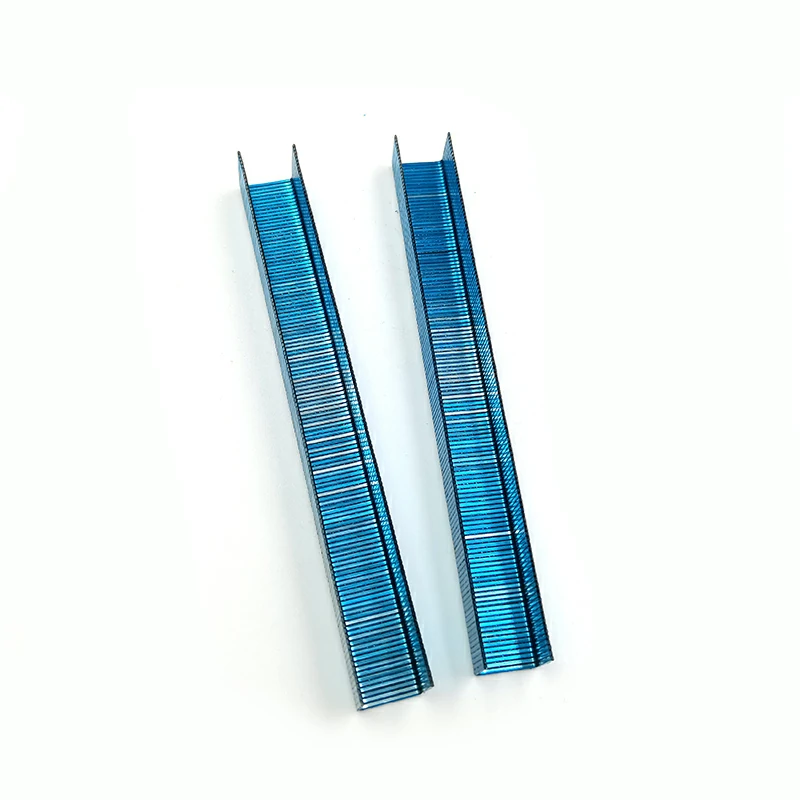The 10J Series Fine Wire Staple Nails are typically manufactured using various types of steel. Common materials used include:
- Carbon Steel: This is a widely used material for staple nails due to its affordability and strength. Carbon steel staples are suitable for general-purpose applications but may be susceptible to rust if not properly coated.
- Stainless Steel: Stainless steel staples offer excellent corrosion resistance, making them ideal for outdoor or high-moisture environments. They are more expensive than carbon steel staples but provide longer-lasting performance.
- Galvanized Steel: Galvanized staples are coated with a layer of zinc, which provides a protective barrier against corrosion. They offer better rust resistance compared to plain carbon steel staples and are suitable for both indoor and outdoor applications.
- Aluminum: Aluminum staples are lightweight and resistant to rust, making them suitable for applications where weight is a concern or where exposure to moisture is expected.
The choice of material depends on factors such as the specific application, environmental conditions, desired durability, and budget constraints.
How does the flexibility of 71 Series Fine Wire Staple Nails affect their usability?
The flexibility of 71 Series Fine Wire Staple Nails can significantly impact their usability, depending on the application and materials being fastened. Here’s how flexibility affects usability:
- Versatility: Fine wire staple nails with higher flexibility can conform better to irregular surfaces or materials with varying thicknesses. This versatility allows them to be used in a wide range of applications, including upholstery, woodworking, insulation installation, and packaging.
- Ease of Use: Flexible staple nails are easier to drive into materials without causing damage or splitting, especially when working with softer or more delicate materials like fabrics or thin wood veneers.
- Tight Spaces: In tight or hard-to-reach spaces, flexible staple nails can be maneuvered more easily, allowing for efficient and precise fastening without requiring excessive force or awkward angles.
- Reduced Jamming: Staple nails that are too rigid may be prone to jamming in certain types of staplers, particularly in high-speed or automated stapling equipment. Flexibility helps reduce the risk of jamming, leading to smoother operation and increased productivity.
- Durability: While flexibility is advantageous in many cases, excessively flexible staple nails may lack the necessary strength and stability for demanding applications. It’s essential to strike a balance between flexibility and structural integrity to ensure reliable performance and long-term durability.
Overall, the flexibility of 71 Series Fine Wire Staple Nails enhances their usability by enabling versatile application, ease of use, maneuverability in tight spaces, and reduced risk of jamming, making them suitable for a wide range of fastening tasks.
What are the typical dimensions of 20 Gauge Wide Crown Stainless Steel Staples?
The typical dimensions of 20 gauge wide crown stainless steel staples can vary slightly depending on the manufacturer and specific product line. However, here are the common dimensions you might expect:
- Gauge: 20 gauge refers to the thickness of the wire used to make the staples. In this case, it indicates that the wire is approximately 0.0360 inches (0.9144 millimeters) in diameter.
- Crown Width: Wide crown staples typically have a wider crown compared to standard staples. The crown width for 20 gauge wide crown staples is typically around 1 inch (25.4 millimeters). However, it’s essential to check the product specifications as crown widths can vary slightly.
- Leg Length: The leg length of staples refers to the length of the legs that penetrate the material being fastened. For 20 gauge wide crown staples, common leg lengths range from 1/2 inch (12.7 millimeters) to 1-1/2 inches (38.1 millimeters) or more, depending on the intended application.
- Wire Material: Stainless steel is the material of choice for these staples due to its corrosion resistance, making them suitable for outdoor or high-moisture applications.
These dimensions provide a general idea of what to expect, but it’s essential to confirm the specific dimensions with the manufacturer or supplier when purchasing 20 gauge wide crown stainless steel staples for your project.
